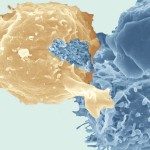Link to Pubmed [PMID] – 16885193
Hum. Mol. Genet. 2006 Sep;15(17):2650-8
Human mannose-binding lectin (MBL) is a member of the collectin protein family that binds a broad range of microorganisms and activates the lectin-complement pathway of innate immunity. Common alleles of MBL2 disrupt the MBL protein or modulate the amount of protein produced, resulting in MBL deficiency. The clinical manifestations of MBL deficiency have been extensively studied but the actual role of this lectin in immunity to infection remains a matter of strong debate. MBL is commonly thought to play a key role in protective immunity, because MBL deficiency has been associated with an increase in susceptibility to infectious diseases. However, the high worldwide prevalence of multiple MBL2 deficiency or low-producing alleles suggests the converse that MBL deficiency confers protection. To explore the underlying forces accounting for the high worldwide prevalence of MBL2 deficiency alleles, we characterized genetic diversity in and around the MBL2 genomic region in 1166 chromosomes from 24 worldwide populations. Our results clearly demonstrate that the patterns of MBL2 variation are compatible with neutral evolution, as opposed to negative, positive or balanced natural selection. The high worldwide frequencies of MBL2 alleles associated with the production of little or no protein therefore result exclusively from human migration and genetic drift. The evolutionary neutrality of MBL2 strongly supports the notion that MBL2 variation does not have strong effects on population fitness, suggesting, therefore, that this lectin is largely redundant in host human defences.

